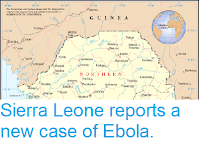A hospital in the Democratic Republic of Congo has reported a new case of Ebola, only days before the epidemic there was due to be be declared over. A 26-year-old man arrived at a hospital in Beni in North Kivu Pronvice with symptoms of the disease earlier this week, and died on the evening of Thursday 9 April 2020. Prior to this the country had been without reported cases for 52 days. It is thought likely that the man was part of a previously undetected chain of infection, and that there are, therefore, other undetected cases in the country.
Healthcare workers at an Ebola treatment centre in Beni, Democratic Republic of Congo. Hugh Kinsella Cunningham/EPA.
The current Ebola outbreak in the Democratic Republic of Congo began in August 2018, with 3454 known infections since that time, 2274 of whom have died. This is the second deadliest outbreak of the disease ever recorded, surpassed only by the West African outbreak of 2014-16, which infected more than 28 000 people, with over 11 000 deaths. The disease has been held in check with a mixture of widespread testing and vaccinations, though this has been hampered by the widespread political unrest and violence in the Democratic Republic of Congo, with healthcare workers having been attacked on several occasions, often with lethal results.
Ebola Haemorrhagic Fever is caused by RNA Viruses of the genus Ebolavirus.
It has a reputation for being the world's deadliest viral disease, at
least in part due to the 1995 film Outbreak, though this is probably
slightly inaccurate as about 50% of victims survive, making it less
deadly than diseases such as Rabies. However, it is extremely contagious,
with know known cure, and has a tendency to rapidly
overwhelm local health systems as health workers themselves are
infected.
Ebola begins with a fever similar to that caused by Influenza or
Malaria, which tends to come on rapidly two-to-three weeks after
infection (during at least part of which time the patient is already
infectious). This tends to be followed by extreme respiratory tract
infection, headaches, confusion, rashes and tissue necrosis and heavy
bleeding. Death is generally caused by multiple organ failure.
The only known treatment for Ebola is intensive rehydration, which can
improve the survival prospects of patients greatly, accompanied by
anticoagulants and procoagulants to mange the diseases attacks on the
circulatory system, analgesia to cope with the pain of the disease and
antibiotics and antimycotics to prevent secondary infection. Due to the
highly contagious nature of the disease it is recommended that
healthcare workers wear full-body protection to maintain a barrier
between them and their patients; a daunting prospect in the tropical
regions of Africa where the disease is endemic.
Ebolavirus is thought to have a non-human animal vector, since
its rapid onset and high mortality rate appears to preclude a permanent
residence within Human hosts. Surveys of wild animals have found Ebola
infections in Rodents and Great Apes, however these were affected by the
disease in a similar way to Humans, and are therefore unlikely
permanent hosts. The most likely vectors are thought to be Fruit Bats or
small Primates, which are endemic to the areas where the disease occurs
and which are widely eaten; cooking meat probably kills the virus, but
there is a distinct danger of infection while preparing carcasses.
Electron micrograph of an Ebola Virus particle. Frederick Murphy/Centers for Disease Control and Prevention/Wikimedia Commons.
See also...
Follow Sciency Thoughts on
Facebook.








